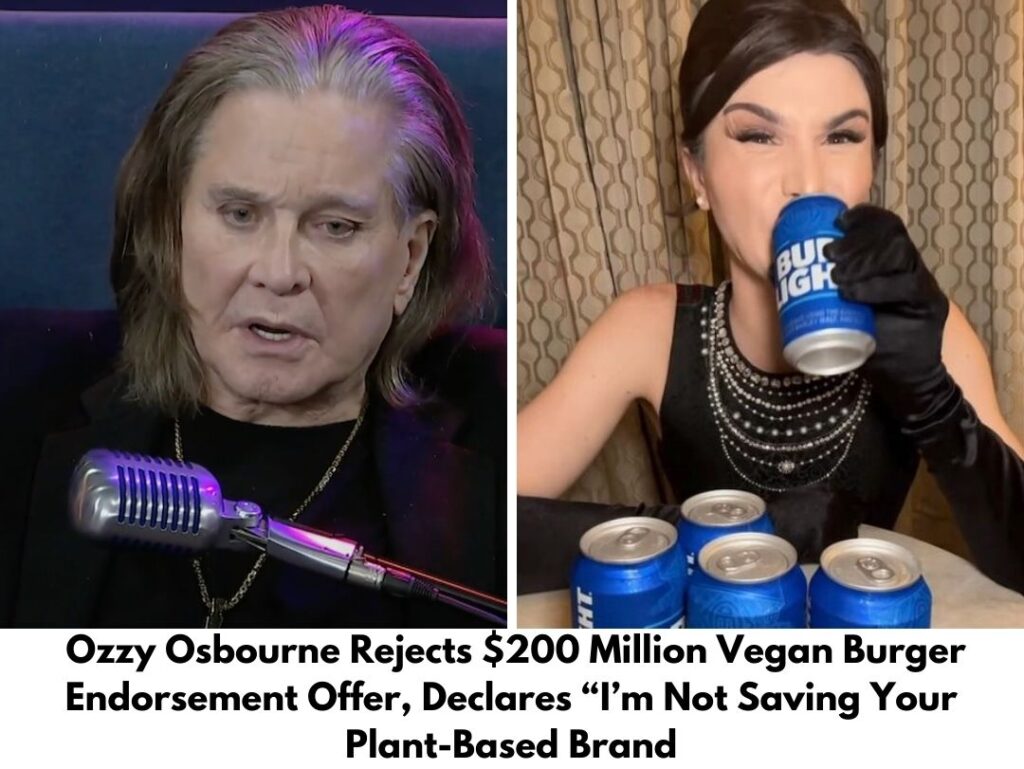Breaking: Ozzy Osbourne Rejects $200 Million Vegan Burger Endorsement Offer, Declares “I’m Not Saving Your Plant-Based Brand

Breaking: Ozzy Osbourne Rejects $200 Million Vegan Burger Endorsement Offer, Declares “I’m Not Saving Your Plant-Based Brand”
In a surprising twist in the world of metal music and celebrity endorsements, iconic metal vocalist Ozzy Osbourne has made headlines by turning down a staggering $200 million endorsement deal from GreenCore, a leading vegan burger company. This decision comes amid ongoing debates about the food industry’s shift towards embracing sustainability and plant-based diets.
Osbourne’s refusal highlights the evolving relationship between metal musicians and corporate brands, as well as the complexities surrounding the concept of “ethical consumerism” in marketing. In this article, we delve into the reasons behind Osbourne’s decision and its implications for both the vegan food giant and the broader advertising landscape.
Ozzy Osbourne, renowned as the “Prince of Darkness” and the frontman of Black Sabbath, is no stranger to endorsements and brand partnerships, often aligning with products that match his hardcore image. Known for his wild stage antics and distinctive voice, Osbourne’s rejection of GreenCore’s offer was both unexpected and bold.
The $200 million offer from GreenCore underscores Osbourne’s star power and the company’s commitment to associating with high-profile figures to promote their products. This substantial sum reflects GreenCore’s desire to appeal to a broader and more diverse consumer base.
In recent years, food companies have increasingly positioned themselves as champions of sustainability and ethical consumption, emphasizing plant-based diets, environmental responsibility, and health consciousness in their advertising. While this strategy has resonated with some consumers, it has also drawn criticism from those who view it as pandering or a departure from traditional brand identities.
Osbourne’s decision to reject GreenCore’s offer came with a striking statement: “I’m not saving your plant-based brand.” This powerful declaration highlights his stance against endorsing brands perceived as overly aligned with current ethical trends.
In today’s polarized social climate, the concept of ethical consumerism has become a contentious issue. Some argue that brands should use their platforms to promote sustainability and social responsibility, while others believe companies should focus on their core products without engaging in broader societal debates.
Osbourne’s rejection is more than a financial decision; it represents a stand against the perceived over-politicization of brands. His statement suggests he is unwilling to associate with a brand prioritizing a particular social agenda over its core identity.
This move also underscores the growing influence of metal musicians in shaping public discourse. As public figures with significant followings, metal artists can sway public opinion and consumer behavior. Osbourne’s refusal sends a message to both the brand and the public that not all musicians are willing to support causes they do not fully endorse.
GreenCore’s offer to Osbourne was a strategic move to enhance its image and reach a wider audience. However, Osbourne’s rejection could impact the brand’s reputation. While some consumers may appreciate GreenCore’s alignment with ethical values, others may see the rejection as evidence that the brand has strayed from its traditional image.
This incident raises questions about the effectiveness of celebrity endorsements in today’s market. With consumers valuing authenticity and transparency, celebrities who decline deals based on personal values may resonate more with certain audiences.
Osbourne’s decision and statement highlight the evolving dynamics between metal musicians and brands. It emphasizes the importance of authenticity and alignment between a musician endorser and a brand’s values and messaging.
In a market flooded with advertisements and endorsements, authenticity has become crucial for consumer trust and loyalty. Brands must carefully craft their messaging and partnerships to connect with their target audience without alienating others.
Osbourne’s rejection of the $200 million GreenCore offer and his declaration, “I’m not saving your plant-based brand,” mark a significant moment in celebrity endorsements and marketing. It reflects the ongoing debate about the role of brands in social and political issues.
As the advertising landscape evolves, brands must balance staying true to their identity with adapting to societal changes. Celebrity endorsements will continue to be powerful, but only when perceived as authentic and genuine by consumers. Osbourne’s stance reminds us that in today’s market, authenticity and values are paramount.